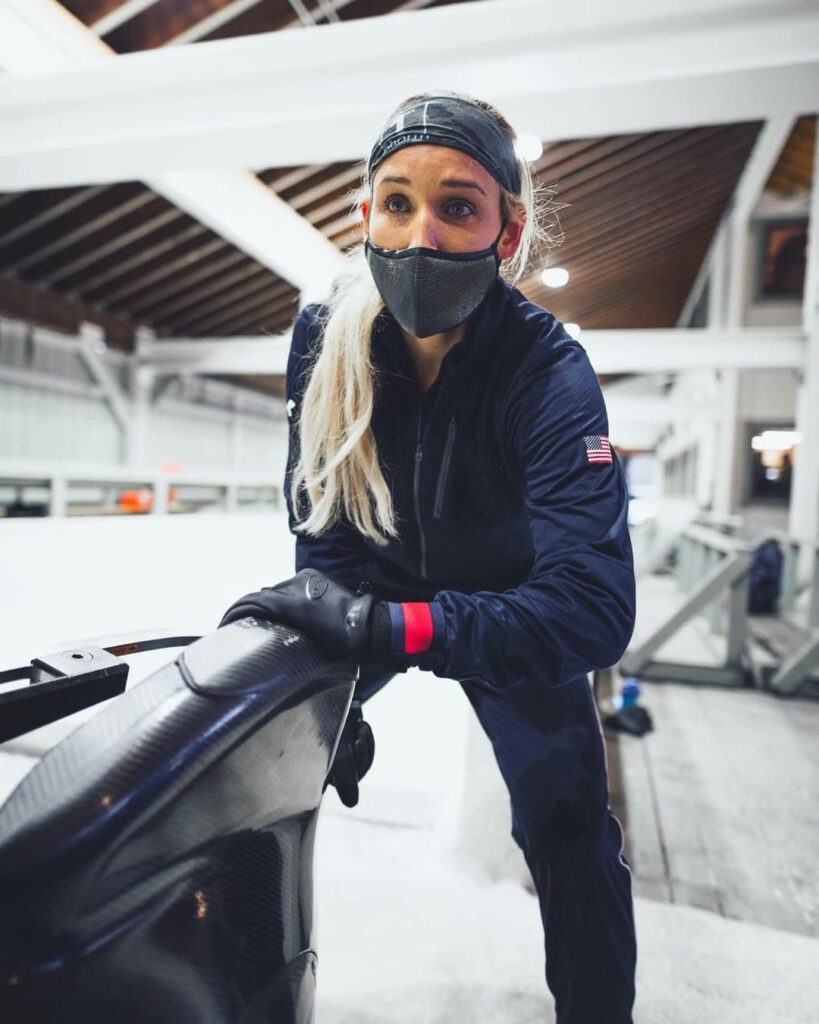Overcoming Failure And Defeat With Olympic "Gold Medal Loser" Lolo Jones
Overcoming Failure And Defeat With Olympic "Gold Medal Loser" Lolo Jones
Lolo Jones (@lolojones) is a 3-time, 2 sport Olympian and World Champion, social media influencer and reality show star. She joins Chris Van Vliet to talk about her podcast called "Gold Metal Loser", her career as a hurdler in the Summer Olympic Games and as a bobsledder in the Winter Olympic Games, the lessons she has learned from defeat, what a typical day of training looks like, why she wrote her book called Over It: How to Face Life's Hurdles with Grit, Hustle, and Grace and much more!
Save $15 sitewide and get free shipping from Almond Cow HERE!
I love that post you put up the other day. You mentioned that Tom Brady has unretired and you feel great.
“Yeah you always feel good until you go out onto the track. Tom Brady feels great right now but wait until he gets onto the field and people start hitting him again. I love what Tom Brady is doing right now, because he gives me a perfect explanation of what I am going through right now. People are like ‘Oh are you retired?’ And I go ‘I am on the Tom Brady retirement plan.’ Once I say that, people back the f off and give me some space. So I could be retired tomorrow or I could make another push, who knows?”
I feel like you are still training your ass off though.
“I am but I am not posting so much, I am tired of the hate and tired of being forced into retirement. I’m kind of doing my own thing and seeing what my body can do. So I am not making any commitments for an Olympic push, the next Olympics is like 2 years away because of COVID. I’m just wanting to see if I can get back to hurdling injury free. But it’s a grind and a hustle and I love it. If I wasn’t retired, I could come home and eat a whole cake. But I am doing this track thing so I have to be still very diligent in my actions.”
I mean you have been living and eating like an athlete for pretty much your entire life.
“Yeah but bobsledding gave me a bit of a break because I had to actually gain weight. I was able to live a little more for that, I could eat cheeseburgers whenever I wanted to and eat pizza and not feel guilty about it. However, when it came to training I still had to train my ass off. When it came to competing in track and field it’s like being a wide receiver, being very light and agile. Then going to bobsled, it was like I was a line backer, I needed the muscle mass. It was just a different mentality.”

So can you walk us through a typical day of Olympic training?
“Most people assume that we wake up at the crack of dawn Rocky style and running the stairs. But today my training was at 11am, so I woke up around 9:45. Once I go to training, it is 2 to 3 hours of running and weights, and then take a break for lunch. I will then do some yoga or pilates after. It’s one hard workout a day and then a softer one later on.”
What does recovery look like?
“I am like a cat, I sleep a lot. This past weekend I just slept through it all and watched TV. It was amazing and it was glorious. I am a napper, how do people not take naps?”
So on competition day, what gets you up and ready to go?
“Competition day is different because sometimes you taper before a competition so you are well rested. Also you get paid for competition, who doesn’t get motivated by money? The practices are like homework, but the competition is like an exam. It makes all the hard work worth it if you win.”
At what point did you realize that you have the talent and this crazy work ethic and you could be the best in the world?
“You never really get to that point. I have broken records and have made summer and Olympic teams, but I still have doubts of if I am good enough. When anyone starts a dream, we all hinder ourselves by wondering if we have what it takes. I am telling you from me, from someone who has tasted every elite experience, you will always have those feelings. It’s just about overcoming it and not taking it for granted. Maybe other athletes are super confident, but I don’t know, I have made it through grit and not giving up and putting all my effort into this.”
You’re a podcaster now, congratulations on this! How did you come up with the title?
“So my podcast title is Gold Medal Loser, for people who don’t really know me, I was one hurdle away from winning the gold at the Olympics games. I hit the hurdle and it cost me everything. People have teased me on social media for it, but if I didn’t do that, maybe I wouldn’t have competed in both the summer and winter games. I have used that failure into extreme motivation for me, so I hope that others who have gone through failures can use this to inspire them. Every guest who I have had on loves the title.”

Do you look at 2008 Beijing as a failure or a bump in the road for everything that happened after that?
“I can look at it as both. I would have loved to not hit that hurdle, but if I won the gold medal then I would have been out of the games years ago. But because I hit that hurdle, it was fuel for the fire for so many years. An Olympic gold medal would be a huge honor, but being a summer and winter Olympian is badass. Only 11 people have done both, there are thousands who have just done one. I know how that sounds but there are thousands of people who have competed in the summer or winter Olympics, only 11 have done both. It’s a pretty cool stat, so if I’m inspiring the masses, I have a real life story.”
I love the theme of your podcast. What is the biggest lesson that you have learned from that failure?
“I don’t know. You know, I think I am still not over it. Sometimes I will be washing my dishes and I will be crying and be like no I am over it. I don’t know, honestly, not what I have learned but how tough I am. I can get teased from that for years, recently I put up a post and someone commented ‘I don’t want to train with her, she didn’t win the gold.’ 14 years and I am still getting this! It just showed me how strong I am to continue to deal with the nonsense. Life can not break you, instead you can use these things to show how tough you are and achieve great things from failures.”
When did the abuse first start happening?
“It wasn’t until later on. When it first happened I was America’s sweetheart, everyone loved me and had my back. But back in 2008, social media was not really a thing, I did not have Twitter at the Olympics. But in 2012, there was Twitter and Instagram, and I saw how people changed with social media. My comments became less positive and more negative, people realized that the more they were negative, the more they would get the likes and go viral. Most of my fans were cool, but there were some that were just trying to get into the spotlight. When I got 4th at the Olympics in 2012, people were furious. They were like ‘She should give her sponsorship money back.’ and ‘She’s a washout.’ I had spinal surgery the year before, but people are mad because I couldn’t win an Olympic medal. My teammates were frustrated that I got the publicity, but they were not active on their social media to get publicity.”
You can’t control what people say on social media but you can control how you react though.
“Yeah sometimes I let it slide, but if I am feeling feisty then, well you know. If you have a good comeback, you can shut a troll down, it just depends on my mood.”
When did you start getting noticed for reality shows?
“I think it was when I did Dancing With The Stars. I was the first one out, an 80 year old lady beat me! But I got a knack when I realized I could make more money on them than for the Olympics. There is no prize money for the Olympics, which is crazy as it’s a billion dollar corporation. They say it’s non-profit but there is, and the athletes get none of that. World Championships, if I win track and field it is $60,000 and bobsled is $10,000. That’s not a lot of money for a whole season of work, and the World Championships are every 2 years, so cut that prize money in half. When I saw how much I made on Dancing With The Stars, I’m like I can make this! When the pandemic hit I just tried to get on anything to survive.”
If someone wants to follow in your footsteps, what would you say?
“Don’t do it [laughs]. There is no money in it, pick a different sport. Learn to throw and catch a football, make it in the NFL and make millions. The practice squad alone makes $500,000 a year, track athletes do not make that. But seriously, my advice is that it will be a long road, don’t get too confident in victories or too hard on the losses.”
I end every interview talking about gratitude. What are 3 things in your life that you are grateful for right now?
“My health, my loan car because my current car is leaking coolant and my teammates.”
Embedded images: Instagram







